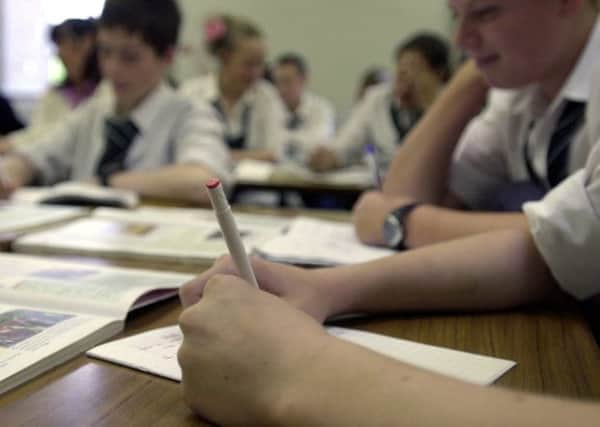Must do better – the verdict on bid to help schools improve


Watchdogs said the authority has failed to make sufficient progress in improving schools since a previous visit in November 2013 led to a highly-critical report.
In the latest report, Ofsted said students’ chances of attending a good secondary school were “extremely limited.”
Advertisement
Hide AdAdvertisement
Hide AdAnd although the inspectors found a “more rigorous” approach to school improvement was now being adopted by the town hall, they said this was only done recently and is yet to make any real difference.


One council chief today admitted it was “no secret” there is a major problem with some Blackpool schools, while Ofsted said there were “significant weaknesses” in council efforts to support improvement.
Among the other criticisms of the council following the four day inspection are:
Too many students left Year 11 without good GCSEs including English and maths,
Advertisement
Hide AdAdvertisement
Hide AdThe council has not reduced inequality between different groups of pupils
Council officers have not been enabled to take effective action to prevent failure.
Councillors are not doing enough to hold senior leaders to account.
The report also highlights how school failure has not been prevented, with two secondary schools including an academy having been judged inadequate since the last inspection.
Advertisement
Hide AdAdvertisement
Hide AdAlmost all secondary schools and a third of primary schools have been identified by the council as “causing concern”.
In her letter to the council detailing the findings, Ofsted inspector Joanne Olsson says: “Significant weaknesses remain in the local authority’s arrangements to support school improvement.
“Consequently, progress since the last inspection has been too slow. Recent changes are signalling a more rigorous and cohesive approach to school improvement work.
“However, much of this work is too new to have made any marked difference.”
Advertisement
Hide AdAdvertisement
Hide AdTwo of Blackpool’s schools have been placed in special measures, the lowest ranking for schools by Ofsted, in the last 12 months – Montgomery High School in Bispham, and Highfield Humanities College in South Shore.
They join the now defunct Bispham High School, which was placed in special measures in 2013, the first Blackpool secondary to be rated so poorly.
The resort has no outstanding rated secondary schools. St George’s School, Marton, and St Mary’s Catholic Academy are both rated as good.
In 2014, overall figures for GCSE grades across the resort dropped from previous years, to 44 per cent of children achieving at least five or more GCSEs at A*-C, including English and maths, down from 48 per cent. The national average by the same measure stood at 56.6 per cent.
Advertisement
Hide AdAdvertisement
Hide AdCoun Tony Williams, leader of the Conservative group on Blackpool Council, branded the report “damning”.
He said: “The real concern is our children are not getting the education they need and deserve.
“Despite claims from this administration they ‘are moving in the right direction’ it’s quite clear it’s not good enough or fast enough.”
He added: “Despite there being some signs of betterment in a couple of areas, it’s quite clear this authority’s efforts to make improvements to our failing education system have been an overall disaster.
Advertisement
Hide AdAdvertisement
Hide Ad“This whole department from the portfolio holder down needs a complete shake up before the inspector implements much stronger measures.”
Four inspectors visited the council from December 8 to 12 last year. They met with headteachers, principals, governors, council officers, councillors and other partners.
There were some positives, with fewer pupils leaving school without either going into a job or further training, absence rates have dropped and relationships with academy school leaders are improving.
The Gazette asked for an interview with children’s services chief Ivan Taylor about the results of the report and were told he was unavailable.
Advertisement
Hide AdAdvertisement
Hide AdIn a statement provided to The Gazette, Coun Taylor said: “Every child in Blackpool deserves to get the best possible education, regardless of the background that they come from or the school that they go to. That’s what we’re working towards.”
He added: “It’s no secret there are problems with some of our schools in Blackpool – and that isn’t good enough.
“We’re aware of the problems which Ofsted has raised and we are working closely with schools and the Regional Schools Commissioner to rectify them.
“Generally speaking, our primary schools are performing well and children in those schools make good progress but there is more work to be done with our secondary schools to improve their outcomes.
Advertisement
Hide AdAdvertisement
Hide Ad“Both the council along with the all town’s schools are clear improvements need to be made and we are all working together to put plans in place to make that happen. Whether that school is one maintained by the council or one that is run by an academy trust, we are determined to work in partnership with school leaders to improve outcomes for all young people.
“Some of those improvements have been recognised by Ofsted, which is pleasing, and this council’s commitment to turning our fortunes around has been well received by inspectors.”
Since the last inspection, a new director of children’s services, Delyth Curtis, has been appointed. Ofsted has made recommendations for improvement and expects to carry out another inspection within two years.
The criticisms in full...
The inspectors found that...
Students’ chance of attending a good secondary school were “extremely limited”.
Advertisement
Hide AdAdvertisement
Hide AdToo many students left Year 11 without good GCSEs including English and maths.
The council has not reduced inequality between different groups of pupils.
School failure has not been prevented, with two secondary schools including an academy having been judged inadequate since the last inspection. Almost all secondary schools and a third of primary schools have been identified by the council as “causing concern”.
Council officers have not been enabled to take effective action to prevent failure.
Advertisement
Hide AdAdvertisement
Hide AdCouncillors ackowledge weaknesses but do not do enough to hold senior leaders to account.
Not enough has been done to promote partnership working between schools.
School leaders and key partners have not had enough of a say on the school improvement strategy.
The council has placed an over-reliance on its officers rather than commissioning support from outside the authority.
Advertisement
Hide AdAdvertisement
Hide AdData has not been used to develop an understanding of pupils’ achievements and set targets.
Support and training is not tailored to council-wide weaknesses.
Funding has been allocated to bring about improvements but the lack of success means this has so far represented poor value for money.
...and what was positive
The number of children leaving reception with a good level of development is increasing.
Advertisement
Hide AdAdvertisement
Hide AdThe proportion of pupils succeeding in the Year 1 ‘phonics screening check’ is improving at a quicker pace than nationally.
Primary schools help pupils reach the levels expected for their age.
Special school provision and support for children who attend the pupil referral unit are strong and children are being re-integrated into mainstream schools where appropriate.
Efforts by the council to tackle the number of young people not in employment, education and training are “reaping rewards”.
Advertisement
Hide AdAdvertisement
Hide AdThe number of students who are absent from school for long periods has fallen considerably.
Senior officers have shown a ‘renewed determination’ to improve the situation and are now using warning notices, pre-warning notices and letters to central government about academies to raise concerns.
Schools causing concerns are reviewed through regular meetings and this has helped to support improvement in primary schools - although not secondaries.
Expertise from schools outside the council’s area is used to support training and help schools where leadership is causing concern.
Relationships with academy school leaders are improving.
Support for governing bodies has been strong and good governors have been recruited.